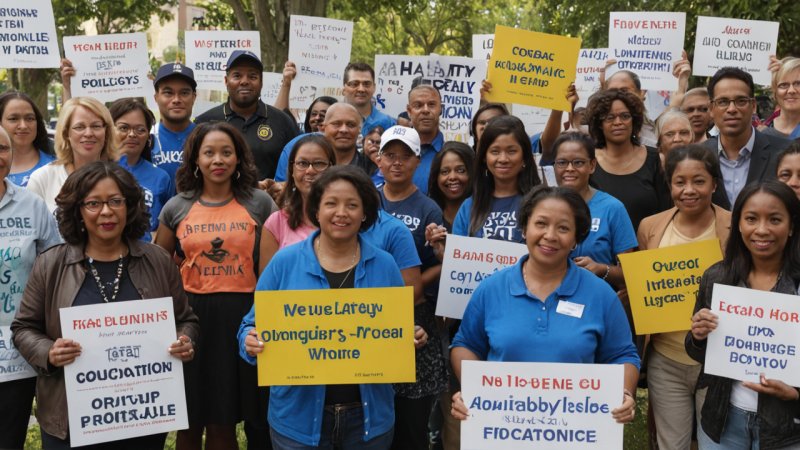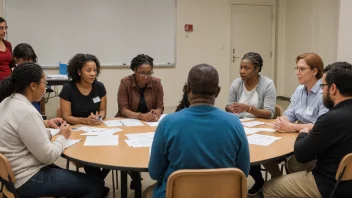In a world where access to education remains a fundamental right yet a persistent challenge for many, advocacy groups play a critical role in advancing literacy legislation. These organizations not only raise awareness about the importance of literacy but also actively engage with policymakers to ensure that effective laws and programs are put in place to support those in need. The fight for literacy is not just about reading and writing; it encompasses a broader understanding of empowerment, social equity, and community development. This article delves into the significant influence of advocacy groups in shaping literacy-related policies and legislation, illustrating their strategies, successes, and the vital need for continued support and involvement from individuals and communities alike.
Understanding the Importance of Literacy
Literacy is the cornerstone of education, enabling individuals to communicate, access information, and participate fully in society. It directly impacts employment opportunities, health outcomes, and civic engagement. According to UNESCO, over 773 million adults worldwide lack basic literacy skills, highlighting the urgent need for comprehensive literacy initiatives. Advocacy groups recognize that improving literacy is not merely an educational issue; it is a social justice issue that affects economic stability, public health, and even environmental sustainability. By pushing for effective legislation that prioritizes literacy, these groups aim to dismantle barriers that prevent individuals from achieving their full potential.
The Role of Advocacy Groups
Advocacy groups serve as the voice of the marginalized, working tirelessly to influence public policy and legislative changes that promote literacy. They employ various strategies to achieve their goals:
- Research and Data Collection: Advocacy organizations often conduct research to gather data on literacy rates, barriers to education, and the effectiveness of existing programs. This information is crucial for informing policymakers and the public about the urgent need for legislative action.
- Public Awareness Campaigns: Through campaigns, workshops, and community events, advocacy groups raise awareness about literacy issues, mobilizing communities to demand change. They highlight personal stories that resonate with the public, illustrating the real-world impact of illiteracy.
- Lobbying and Policy Engagement: Advocacy groups engage directly with lawmakers, presenting research findings and recommendations to influence legislation. They work to ensure that literacy is prioritized in educational policies and that funding is allocated to effective literacy programs.
- Collaboration with Other Organizations: Many advocacy groups partner with schools, local governments, and other non-profits to create comprehensive literacy initiatives. By pooling resources and expertise, they can develop more effective programs and reach a wider audience.
Case Studies of Successful Advocacy
Several advocacy groups have made significant strides in advancing literacy legislation around the world. For instance, the National Literacy Trust in the UK has successfully influenced government policy by providing evidence-based recommendations for improving literacy among children and adults. Their campaigns have led to increased funding for literacy programs in schools and communities.
In the United States, the Campaign for Grade-Level Reading has united various stakeholders, including government agencies, non-profits, and businesses, to focus on the critical years of early childhood education. Through their advocacy efforts, they have promoted legislation that supports reading initiatives and resources for low-income families, significantly impacting literacy rates.
How Individuals Can Get Involved
While advocacy groups are at the forefront of advancing literacy legislation, individual involvement is equally essential. Here are some ways that individuals can contribute to the cause:
- Stay Informed: Keep up to date with local and national literacy issues. Understanding the current landscape of literacy legislation will enable you to engage more effectively.
- Volunteer: Many advocacy groups rely on volunteers to help with outreach, research, and events. Offering your time and skills can make a significant difference.
- Advocate for Change: Use your voice to speak out about the importance of literacy. Write to your local representatives, participate in community discussions, and share information on social media.
- Support Local Literacy Programs: Participate in or donate your time to local literacy initiatives, such as tutoring programs or community reading events. Every effort counts in the fight for literacy.
Challenges Ahead
Despite the efforts of advocacy groups, challenges remain in the quest for comprehensive literacy legislation. Funding cuts to education, political polarization, and the ongoing impact of global crises such as the COVID-19 pandemic have exacerbated existing inequalities in literacy access. Advocacy groups must continue to adapt their strategies and work collaboratively to overcome these obstacles.
Conclusion
Advocacy groups play an indispensable role in advancing literacy legislation, serving as both champions for change and facilitators of community empowerment. Their work is vital in addressing the systemic barriers that hinder individuals from achieving literacy. As we move forward, it is crucial for individuals and communities to support these efforts actively, ensuring that the right to literacy is upheld for everyone. By joining forces with advocacy groups, we can help create a world where literacy is not just a privilege but a fundamental right for all.






